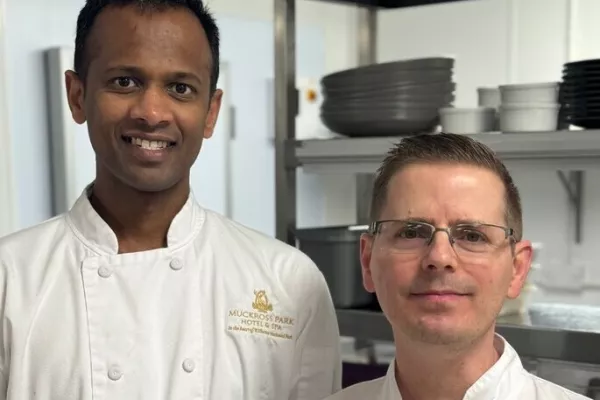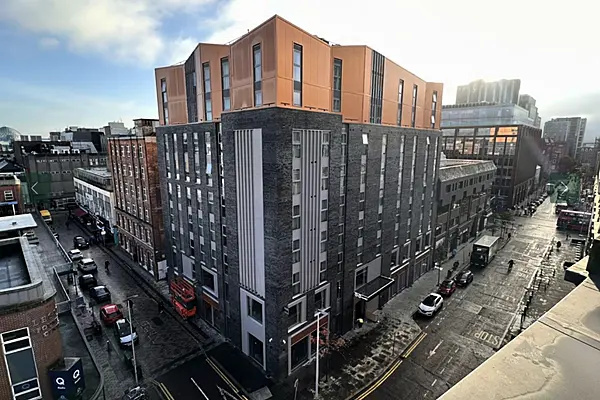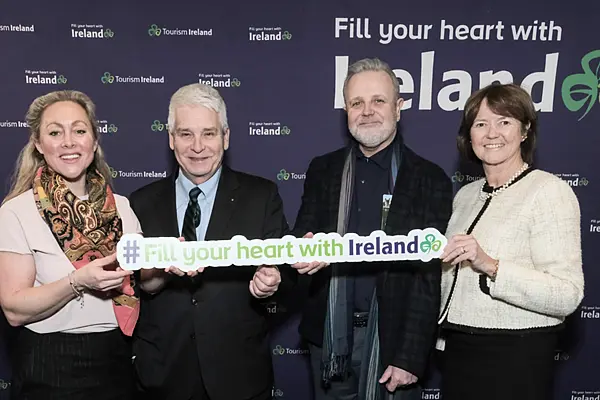Earlier this month, senior chefs across the iNUA Collection took part in the Cliste Hospitality Culinary Competition at Unilever Food Solutions Ireland.
After very careful consideration, Pradeep Sagara Mahawatta from Muckross Park Hotel & Spa was awarded Sustainability Chef of the Year 2024.
Sustainability
Pradeep impressed the judges and spectators with his tuna fish starter, delicately balanced with locally sourced vegetables, and his venison main course, which was accompanied by a red wine jus.
The talented chef is currently working under the careful direction of Scott Kapitan, executive chef at Muckross Park Hotel & Spa.
Scott, originally from Canada, is passionate about sustainability in his kitchen and working with local suppliers.
The Yew Tree Restaurant
The Yew Tree Restaurant in Muckross Park Hotel & Spa is particularly renowned and allows visitors to experience fine dining in the middle of a 25,000-acre national park. The restaurant is set in the luxurious surroundings of the hotel’s original Victorian lounge.
Counting two AA rosettes among its awards, the Yew Tree Restaurant is also listed in the McKenna and Georgina Campbell guides.
Pradeep Sagara Mahawatta and Scott Kapitan spoke exclusively to Robert McHugh about their approach to sustainability in the kitchen and the importance of using local suppliers.
Pradeep, you were recently honoured as the 2024 Sustainable Chef of the Year with Cliste Hospitality. How did it feel to win such an award?
Pradeep: I don’t think this way because we are a team, and I had guidance from my chef.
Scott: Pradeep is too humble! We are very proud of him.
Pradeep: I ask my chefs for ideas, always. This was the first time I entered a sustainability competition in my life.
It was the first time you entered and you won?
Pradeep: (Laughs) Yes.
Why is sustainability so important for a chef?
Pradeep: Because it is healthier and you are not throwing any food in the garbage unnecessarily.
What can a chef do to be more sustainable when she/he/they cook/s?
Pradeep: Use healthy food with correct portions, and use local produce to support the current environment.
Tell us about your background – where you grew up, studied, etc.
Pradeep: I am from Sri Lanka. I have a background in practical cooking, but I never went to college for it – I just did the basics only. I have worked in hotels for a long time.
What was your first big role?
Pradeep: It was in Dubai. I started in the Royal Mirage Hotel, Celebrities restaurant.
What drew you to hospitality?
Pradeep: To be honest, it was from my mum’s direction! She wanted me to be a chef because some of my cousins are chefs, and so she is proud of me.
What brought you to Killarney?
Pradeep: I had been 19 years in Dubai, and I wanted to go to a new environment to gain new knowledge. For the past four months, I have learned a lot from my executive chef.
Scott: Pradeep started with us last season, and in January, he passed his probationary period with flying colours. We are very happy to have him on the team. It is coming up to six months now.
Scott, tell us about the Muckross Park Hotel – the ethos, food, service, etc.
Scott: It is an interesting juggling act with our hotel because, obviously, we are the only hotel in the Killarney National Park. We have a juggling act between serving the customer, but also taking pride in what we do.
The chefs here are very passionate and creative individuals. The Yew Tree Restaurant allows us to express ourselves and push the envelope by looking at the trends of global restaurants and Michelin restaurants in Ireland.
With the Yew Tree, we can express sustainability, creatively and artistically, using local supplies inspired by the nature park. We have to balance this with the bread and butter of the business, such as weddings and banqueting. The ethos with this would be offering a quality product done extremely well. It can be a little more generic than it sounds – not everyone is going to like the artistry – so it’s a balance. We get to play, on one hand, and be more creative, and then it’s the more banqueting style on the other. Those are the two extremes.
With our breakfasts, we try to use local produce or as close to it as possible. We have Clonakilty pudding and sausages from our local butcher in Killarney. Burgers come from local cattle. You see elements of that throughout the menus.
Pradeep comes from Sri Lanka, I’m Canadian, and we have three Irish chefs, so there is going to be a global influence on our culinary experiences, and that showcases throughout all the menus.
What are the major challenges at the moment?
Scott: It has been a tough few years with Covid and uncertainty in Europe. People are a bit nervous, so we have to put employees and our team at ease and assure them that we are going to have a strong season. That way, you maintain retention of staff because once someone is good, you want to keep them.
You have to create an environment where people are enjoying themselves, where they are proud of what they are doing and happy to come to work. There is nothing worse than a disgruntled employee because it’s caustic.
In my team, I have an open-door policy. I am in the trenches with them as much as I can be. The key thing is to maintain morale. It’s a marathon, not a sprint. You want to make sure that your team has longevity.
What are the main opportunities?
Scott: It’s a bitter-sweet love affair. You get bitten by the bug and love what you are doing. You get to be creative. There’s great satisfaction when you’ve done something for a customer and they are blown away. You have gone beyond their expectations. We are lucky to have a team that can deliver that, day in, day out.
We had a couple in last night for a wedding tasting, and they were blown away. That puts them at ease for their wedding night. We are looking forward to having them back, and that happens quite often. You get a buzz – I don’t mean in a sycophantic way – looking for praise. It’s just nice to make people happy.
What do you both like to do when you are not working?
Pradeep: I don’t know. I like to look for good ideas and creations to prepare in regular operations. That’s what I like to do in my free time.
Scott: I agree with Pradeep. You take inspiration just from going for a walk in the national park or riding a bike. Your mind floats back to those things a lot of the time. Food is everywhere.
To disengage from it, I use yoga, exercise, and I read a lot. I try to maintain a healthy mind and body and get a good balance that way.
I am quite often looking for inspiration in my downtime for new ideas and creations. When we are actually in the kitchen, it’s repetition, and you don’t necessarily have the time to come up with ideas.
In your downtime, you can think. There’s almost a mindfulness to it when you step out of the kitchen – out comes the journal and you can sketch out ideas. You can ruminate on what could have been better. Sometimes you have to be a perfectionist if you want to be a chef.







